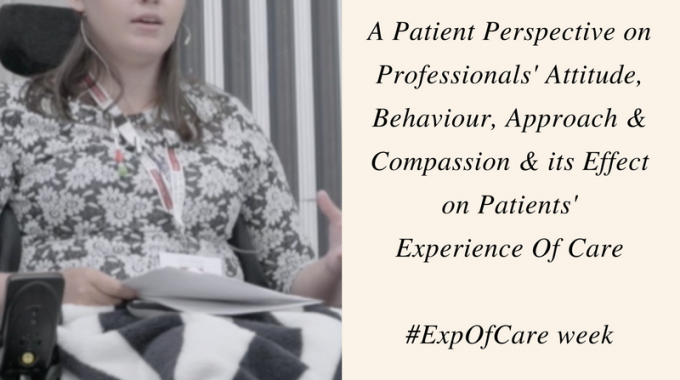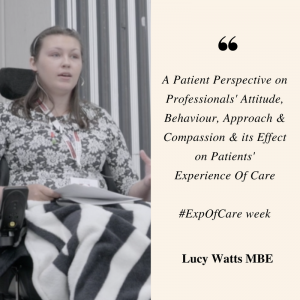What if we viewed lived experience as an asset? As an asset of professional, economic,…

#ExpOfCare Week; A Patient Perspective on Professionals’ Attitude, Behaviour, Approach & Compassion & its Effect on Experience Of Care
#Hellomynameis Lucy Watts MBE. I’m a 24 year old young adult with a progressive, life-limiting condition that has caused very complex medical needs. This means I spend a lot of time in the company of healthcare professionals and far too much time in hospitals, but I am proud to say I have the most incredible medical team to whom I owe both my survival and also the incredible life I live, as they work extremely hard to give me the best quality of life possible.
I was born with health problems and struggled through childhood, but I became disabled and seriously ill at the age of 14. I initially was diagnosed with hypermobile Ehlers-Danlos Syndrome due to my joint hypermobility but we now know I have a neuromuscular disease, for which we are on a diagnostic odyssey, trying to find the cause, and I have complications affecting most organ and body systems. My condition means I am Total Parenteral Nutrition (TPN) dependent, require regular intravenous and buccal medication, I have a gastrostomy (PEG) constantly draining my stomach of the fluids my gut can’t process, I have an Ileostomy and a Urostomy, and I am dependent on a specialist electric wheelchair and spend a lot of time in bed. I have 24 hour care, 16 hours of which is provided by an intensive care nurse, and I have been under palliative care since the age of 17. I’ve outlived my original prognosis, and am determined to far exceed it.
I have an incredible medical team who work extremely hard to keep me alive but also give me the best quality of life possible too. It hasn’t always been this way – we’ve had to fight hard over the years to secure support, and even now there are battles that go on at times – but the medical team I have around me now are fantastic. They view me as part of my own medical team, appointments consist of both of us sharing our desired outcomes and then we work together as to how we can achieve those. They also respect my views and opinions and listen to what I say, respecting that they may be the experts in medicine but I am the expert in my own body – I do live in it, after all!
Over the years, I’ve experienced the best and worst of care. Healthcare professionals’ attitude, behaviour, approach, communication, friendliness and compassion all affect our experience of care. A supportive, kind and compassionate healthcare professional who is very approachable and friendly can give the patient such a positive experience that even when the outcome of the appointment may not be what the patient wanted, that experience overall was a positive one. On the other hand, a healthcare professional who is detached, lacks compassion, isn’t approachable or friendly, can give a negative experience, despite nothing bad happening with their care. It’s important professionals give patients that positive experience. That said, I know everyone has bad days. They’re unavoidable. However, healthcare professionals need to be self aware and be able to adjust their behaviour so that a bad day for you doesn’t mean a bad experience for the patient.
I wanted to share some experiences of mine to evidence positive/negative experiences of care and how they relate to the attitudes, behaviours and other attributes of the staff caring for me, as I mentioned above.
Attitude:
Attitude can have a big influence on experience of care. I have many experiences where attitude has made amazing – or completely broken – my experience of care.
My current team, as I’ve said, are amazing. Their attitude towards me is an attitude of respect. They respect me as an individual, not just with needs, but wishes, goals and a life to live. They also respect and value my input into my care and my wish to take responsibility. They view me as a member of my own medical team, they work in partnership with me – we’re all part of the same team – and we have a very collaborative relationship. They also value the fact that I take charge of my own health and wellbeing and so they know that I will follow treatment plans and act upon their suggestions, but also that I won’t ask them for help unless I’ve tried all tools at my disposal to manage things. This respect, value and collaborative attitude from my medical team means we have a great relationship and I feel valued, I am listened to, and thus I have a good experience of care.
However, attitude has been an issue in some of my experiences. When I go to my local hospital, their attitude is that my attempts to input my knowledge of my condition and needs into discussions and ward rounds as me challenging their authority and me being disrespectful and trying to tell them their job. It’s not, it’s simply sharing my knowledge of how specialist teams manage my condition to try and make my care more efficient and make sure things aren’t done that will exacerbate my condition. I am trying to help, not hinder.
Behaviour:
Behaviour is something that is often overlooked. Attitude and behaviour are often closely linked. In behaviour, I also include the physical way in which my care is delivered.
The biggest thing that often gets talked about, is doctors standing over the bed, above you and talking down at you. Sitting down next to the bed can be far less imposing and immediately improve the feeling for the patient that the doctor is on your level. Being ‘above’ you gives the patient the feeling that they are in a position of weakness and the doctor is in control of the situation and that the patient is somewhat powerless. Sitting beside the patient, talking on their level, gives a feeling of an equal footing and a more compassionate situation.
Now, attitude and behaviour are closely linked. If you come in with a negative attitude, your behaviour will come across to the patient as negative. If you come in with a positive and open attitude, your body language and behaviour will reflect this. Such a minute change in attitude can change the whole perception and experience of the patient. Little things make big differences.
Also and this is a controversial one, it is okay for a professional to get upset in front of a patient when bad news is delivered – so long as the patient doesn’t end up comforting the professional! Holding someone’s hand, sitting on their level and showing your emotion at this situation and difficult conversation actually shows you’re human and compassionate. I’ve had bad news delivered in such compassionate ways. When I was told my prognosis was to be less than 5 years in 2012, my consultant sat on my bed, put his hand on my knee and talked to me. Human to human. He listened, he took all the time we needed, he answered questions and he assured us this didn’t mean giving up, just refocusing attention from quantity of life to quality of life. We already knew my condition would shorten my lifespan, we’d known that for almost 2 years, but going from “we know it’ll shorten your lifespan” to “you’re not expected to see 5 years” are two very different pieces of news to process. That kindness and compassion, the attitude, behaviour, listening, taking the time, talking to me on my level and reassuring me and showing me he was human like me, made all the difference.
Communication:
Communication is a big buzzword at the moment, so much work going on around communication. Being clear and concise, but being kind, listening, flexible in your approach and talking to us on our level is vital. Communication is not just about what you say, but how you say it. Delivery is everything. Bad news delivered in the most kind, compassionate and supportive way will still lead to a good experience, despite the news being bad. Good news delivered by a detached, unemotional and abrasive way, as if you have better things to do and you don’t have time for this menial task will automatically cause a bad experience, despite the news being positive. For example, asking “what matters to you” rather than “what’s the matter with you” – approach to and way of saying things can make all the difference.
Communication is also a lot about listening. Listening to the patient can have a huge impact. Even if you cannot do anything to alleviate the issues raised by the patient, simply listening to them and letting them talk through things is important – and often will reveal information that may aid you as the professional. You never know what you could miss if you don’t take time to listen.
Also, shared decision making is important. Giving us the information and supporting us to take responsibility and be engaged in decisions is important, but that can only be done with open communication, support and enabling informed decisions by giving all the information.
I’ve had doctors cut me off about things, they’ll ask me a question and when I start to explain they’ll cut me off, as if asking an open ended, qualitative question can be answered with yes/no when in fact, it’s never that simple. I know doctors (and nurses) don’t have all the time in the world, but listening is hugely important, being listened to and being heard is of utmost important to patients. It can make or break their experience of care.
Approachability and friendliness:
This reiterates partly what I said in attitude and behaviour. Your attitude and behaviour will have a direct link to the patients’ perceptions of your approachability and friendliness.
You must always introduce yourself, giving your name and speciality/position – #hellomynameis is vitally important. Patients may see dozens of different professionals over the years and/or over the course of an admission, so knowing who people are, what department/specialty they’re from and what their position within that department is, can help patients to feel more at ease as they know who they’re dealing with and where they’re from. It’s also polite! I have said a few times recently, knowing who is looking after you can be the difference between a stranger coming in and doing things to you, vs a professional coming in and doing things to support and assist you – doing things with rather than just to us.
Always ask how we are too – and be prepared to listen. If you are seeing a patient for a period where you’ll only see them whilst inpatient and then you won’t have dealings with them again, try to understand what your patient is like when at home, to better understand them, their wishes and their life ‘outside’. I make a habit of taking photographs into hospital with me so professionals can see me when stable and at home. You may see us at the worst times of our lives, but we do have good times and lives to live too.
Also – smile! Smiling is a universal language and coming in with a smile will brighten up us patients’ lives and our experience.
Compassion:
Compassion is more than just caring. Compassion is an action as well as an attitude and a behaviour. You can’t be compassionate if you don’t practise compassion.
What is compassion? I describe it as: caring, consideration, communication, courage, contemplation, respect and empathy. It combines all of these. Compassion is about caring for and about the patient. It’s about considering their feelings, thoughts, wishes and experiences. It’s about communication, having open, honest but kind and considerate dialogue. It’s about having the courage to invest your feeling and emotion into the patient. It’s about contemplating how you would feel, think and react in that situation. Respect goes both ways and all good relationships are built on mutual respect, but its also about respect for their story, their experiences, their wishes and their unique situation; they’re the one living this life. Finally, empathy. Not just sympathy, but genuine empathy. Feeling and understanding your patient and how they feel and what they’re going through. Empathy for their struggles and the battles they face. Empathy for the fear, the sadness and the frustration. Remember, often you’re seeing us at some of the lowest points in our lives. As I said, compassion is an action as much as an attitude and behaviour.
Every time I’ve experienced compassion, as I have many times, it’s made a huge difference to my experience. From the HCA who held my hand and cried with me as I screamed in pain from a bowel obstruction, squeezing my hand and stroking my hand so I knew I wasn’t alone. To the doctor who sat on my bed and put his hand on my knee as he delivered the prognosis that I wasn’t expected to live another five years. To the student nurse who sat with me and told me stories to distract me from the pain as I lay alone in hospital overnight, acutely unwell whilst Mum went home for the night. To my palliative care nurse who asked me what mattered to me rather than what was wrong with me, and who turned end of life conversations into conversations about things I wanted to do and achieve whilst I’m living. To the doctor who has seen me at the worst times of my condition who declared to a room of doctors, patients and families that I am his favourite patient for how I get on with things and live my life and do things to benefit others – who also sent me an email congratulating me when my MBE was announced. I could go on and on about the compassion I’ve experienced in my care.
I hope you’ve found this blog useful, I apologise it’s so long but I had so much to say on this.
Lucy Watts MBE





I admire her. Thank you for sharing the inspiring post.
html color codes